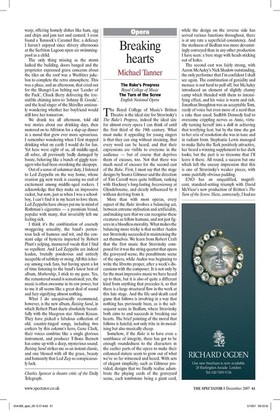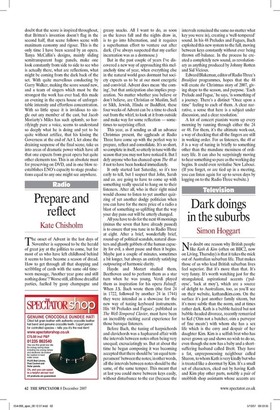Breaking hearts
Michael Tanner The Rake's Progress Royal College of Music The Turn of the Screw English National Opera The Royal College of Music's Britten Theatre is the ideal size for Stravinsky's The Rake's Progress, indeed the ideal size for almost every opera I can think of until the first third of the 19th century. What must make it appealing for young singers is that they can sing without straining, that every word can be heard, and that their expressions are visible to everyone in the audience — but of course that deprives them of excuses, too. Not that there was much need of excuses for the second cast of the Rake. First, I must say that the stage designs by Soutra Gilmour and the direction of Tim Carroll were quite brilliant, ranking with Hockney's long-lasting Inszeniening at Glyndebourne, and clearly influenced by it without deriving from it.
More than with most operas, every aspect of the Rake involves a balancing act, between extreme stylisation and artificiality, and making sure that we can recognise these creatures as fellow humans, and not just figures in a bloodless morality. What makes the balancing more tricky is that neither Auden nor Stravinsky succeeded in maintaining the act themselves. We learn from Robert Craft that the first music that Stravinsky composed for it was the string quartet that opens the graveyard scene, the penultimate scene of the opera, while Auden was beginning to write the libretto proper, after a week's discussions with the composer. It is not only by far the most impressive music we have heard up to then, but it is also of quite a different kind from anything that precedes it, so that there is a large structural flaw in the work at this late stage. And the life-and-death card game that follows is involving in a way that nothing has previously been, as is the subsequent scene in Bedlam, where Stravinsky both aims to and succeeds in breaking our hearts. The brief pointing of the moral that follows is hateful, not only trite in its moralising but also musically cheap.
Somehow, if the Rake is to have even a semblance of integrity, there has got to be enough roundedness to the characters in the earlier parts of the opera to make their enhanced stature seem to grow out of what we've so far witnessed and heard. With sets of elegant simplicity, such as Gilmour provided, designs that we finally realise adumbrate the playing cards of the graveyard scene, each tombstone being a giant card, while the design on the reverse side has served various functions throughout, there is at any rate a superficial consistency. And the starkness of Bedlam was more devastatingly conveyed than in any other production I have seen: a bare stage with heads sticking out of holes.
The second cast was fairly strong, with Aaron McAuley's Nick Shadow outstanding, the only performer that I'm confident I shall see again. The combination of geniality and menace is not hard to pull off, but McAuley introduced an element of slightly clumsy camp which blended with them to intensifying effect, and his voice is warm and rich. Jonathan Stoughton was an acceptable Tom, reedy of voice but even more of a nerd than a rake than usual. Sadhbh Dennedy had to overcome crippling nerves as Anne, virtually turning herself into a doll in achieving that terrifying feat; but by the time she got to her aria of resolution she was in tune and in radiant form. Stephanie Lewis managed to make Baba the Turk positively attractive, her beard a winning supplement to her dark looks; but the part is so tiresome that I'll leave it there. All round, a success but one which left the uneasy impression that this is one of Stravinsky's weaker pieces, with some painfully obvious padding.
ENO has an unqualified, magnificent, standard-setting triumph with David McVicar's new production of Britten's The Turn of the Screw. Here, conversely, I had no doubt that the score is inspired throughout, that Britten's invention doesn't flag in the second half, that scene follows scene with maximum economy and rigour. This is the only time I have been scared by an opera. Tanya McCallin's designs, mainly sliding semitransparent huge panels, make one look constantly from side to side to see who is actually there, what are reflections, what might be coming from the dark back of the set. With quite marvellous conducting by Garry Walker, making the score sound new, and a team of singers which must be the strongest the work has ever had, this made an evening in the opera house of unforgettable intensity and effortless concentration. With so little space it is invidious to single out any member of the cast, but Jacob Moriarty's Miles has such aplomb, so horrifyingly pure a voice, seems to understand so deeply what he is doing and yet to be quite without artifice, that his kissing the Governess at the end of Act I, let alone the draining suspense of the final scene, take us into areas of dramatic power which have all that one expects from great opera but quite other elements too. This is an absolute must for preserving on DVD, and in one blow reestablishes ENO's capacity to stage productions equal to any one might see anywhere.


























































 Previous page
Previous page